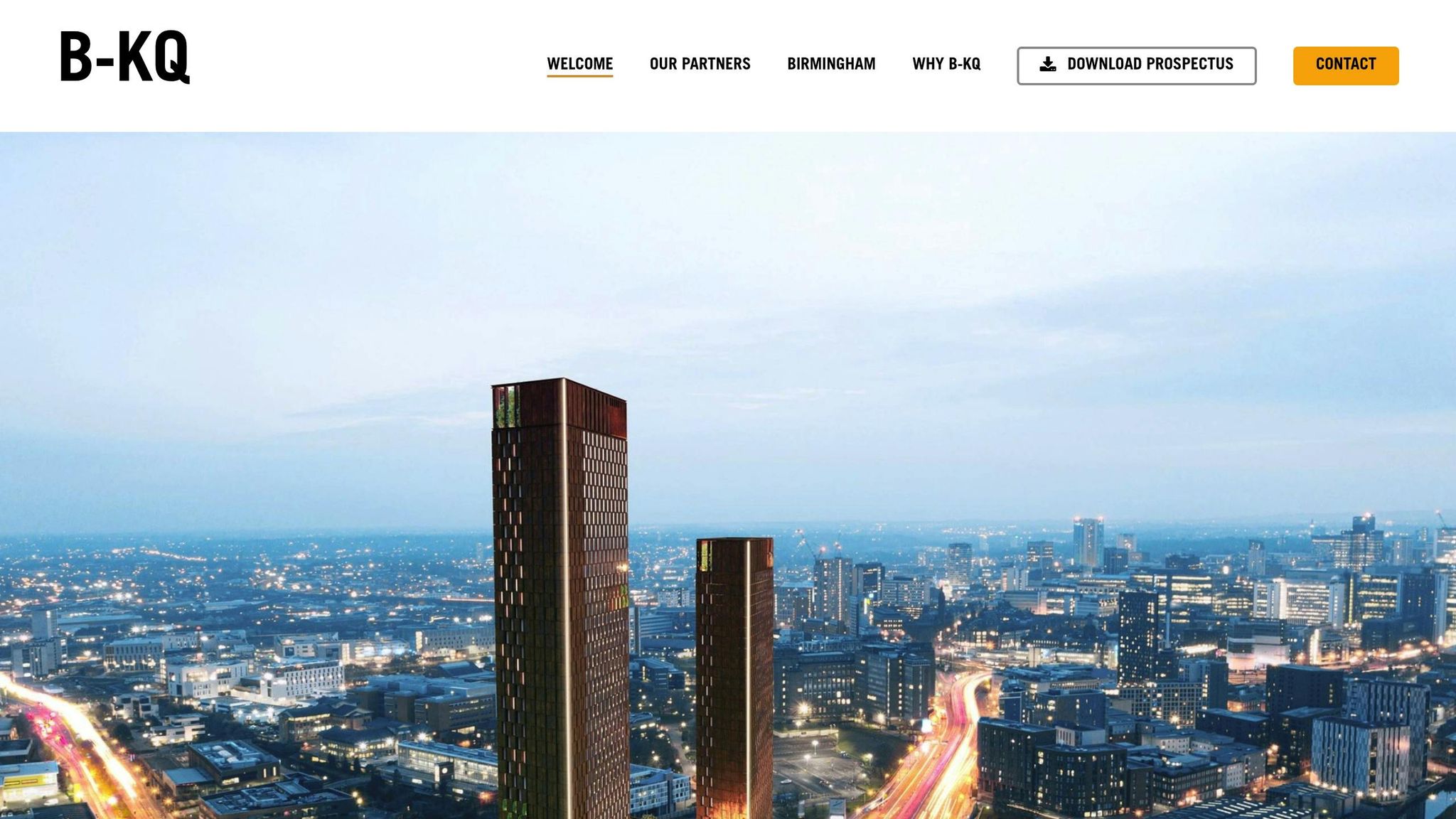Birmingham is leading the way in creating green jobs, blending economic growth with climate action. The city has seen rapid growth in green roles, doubling from 10,000 in 2021 to over 24,000 in 2022, and aims for net zero carbon emissions by 2030. Key initiatives include:
- Investment Zones: £5.5 billion to create 30,000 jobs in advanced manufacturing, green industries, and digital technologies.
- Skills Training: Apprenticeships like the Heat Network Technician programme and climate literacy bootcamps address the green skills gap.
- Community Engagement: Programmes like Community Climate Assemblies and school-based initiatives connect residents with eco-focused opportunities.
- Digital Platforms: Tools like Connecting Birmingham link local talent with green employers.
These efforts highlight the city's focus on linking education, investment, and community involvement to grow its green economy.
Case Study: Birmingham Knowledge Quarter and Green Innovation Corridor

The West Midlands Investment Zone (WMIZ) is setting the stage for a transformative green jobs initiative, targeting three key sites in Birmingham to reshape employment opportunities. With a focus on advanced manufacturing, green industries, and digital technologies, this £5.5 billion programme aims to create over 30,000 jobs across the region.
Mayor Richard Parker underscores the scale of this initiative:
"Our Investment Zone has the potential to deliver £5.5 billion of investment and create 30,000 jobs in the region."
At the heart of this initiative is the Birmingham Knowledge Quarter (BKQ), which leverages Birmingham's 92.3% gigabit broadband availability. This makes it an ideal hub for businesses focused on integrating green technologies into their operations.
Meanwhile, the Wolverhampton Green Innovation Corridor is dedicated to fostering emerging green sectors. Councillor Chris Burden outlines its mission:
"The Green Innovation Corridor will build on the city's strengths in high value manufacturing, green technologies, digital innovation, brownfield land regeneration and sustainable construction to create new, quality jobs and support businesses."
Here’s a look at how WMIZ is turning its strategic vision into tangible job growth.
Methods Behind Green Job Growth
WMIZ is utilising £16 million of Investment Zone funding to address barriers like land remediation and infrastructure development, making urban areas more attractive for business investments.
One standout project is the Birmingham Knowledge Quarter Core, a £4 billion development led by a partnership involving Aston University, Birmingham City University, Bruntwood SciTech, and Woodbourne Group. This initiative will transform a 20-hectare area into a vibrant mixed-use space, featuring:
- 1.35 million sq ft of commercial space
- 2,200 homes
- 400 hotel rooms
- 500,000 sq ft of cultural facilities
This comprehensive approach ensures that green jobs are supported by housing and amenities to attract top talent.
WMIZ also offers a range of tax incentives to encourage investment:
| Tax Incentive | Description | Availability |
|---|---|---|
| Full Business Rates Relief | For newly occupied business premises and certain expanding businesses in tax sites | Until 31st March 2034 |
| Enhanced Structures and Building Allowances | 10% straight-line deduction per annum | Available until 31st March 2034 |
| Full Stamp Duty Land Tax Relief | For land and buildings bought for commercial use or development | Available until 30th September 2034 |
| 100% First Year Capital Allowances | For plant and machinery expenditure | N/A |
| Employer National Insurance Contributions | Threshold raised to £25,000 for new eligible employees for the first 36 months | N/A |
These incentives are crucial in driving investment and supporting Birmingham’s sustainable growth.
In Wolverhampton, the Green Innovation Corridor is taking a phased approach, starting with the University of Wolverhampton's Springfield Campus. The first phase repurposes a 1.21-hectare brownfield site, creating 4,955 m² of innovation space and 330 jobs. This project demonstrates how green job creation can also address urban regeneration challenges.
The corridor also houses the £17.5 million National Brownfield Institute, based at the Springfield Campus. This facility focuses on modern construction methods and fosters collaboration with the building industry. These efforts highlight how local regeneration projects contribute to the region’s broader green job strategy.
Results and Data
The Birmingham Knowledge Quarter is expected to deliver nearly 700,000 sq m of developed floor space, supporting advanced manufacturing, DeepTech, and HealthTech sectors. This will create approximately 20,000 jobs, with opportunities centred on R&D, engineering, and digital technologies. Councillor Sharon Thompson emphasises the project’s broader impact:
"The Knowledge Quarter will be a world-class, city-centre innovation cluster focused on science, technology and enterprise that will deliver an estimated 20,000 jobs and a 4,000 home 'eco-town' - with over a third of those homes being affordable."
In Wolverhampton, the Green Innovation Corridor has delivered impressive results. The full development will provide 22,762 m² of new commercial and incubator space, create 1,220 jobs, and regenerate 2.32 hectares of brownfield land for mixed-use purposes across 3.96 hectares. The corridor has also secured £27 million in government funding to drive these changes.
Professor Prashant Pillai, pro vice-chancellor for research and knowledge exchange at the University of Wolverhampton, captures the vision:
"Through the Green Innovation Corridor we're aiming to establish a world-leading, research-driven innovation district – not just for Wolverhampton, but regionally, nationally, and globally."
The financial benefits are equally compelling. The Investment Zone is projected to generate £1.5 billion in business rates over 25 years, which will be reinvested locally to support further green job creation and infrastructure improvements.
This case study shows how strategic investment in green infrastructure can create a ripple effect, attracting private investment and delivering measurable employment benefits. The combination of academic partnerships, tax incentives, and well-planned locations offers a blueprint for other regions looking to achieve similar success.
Case Study: Skills and Apprenticeship Pathways for Green Jobs
Birmingham has set an ambitious goal: achieving a 60% reduction in carbon dioxide emissions by 2027. This commitment has sparked partnerships between educators and employers to tackle a pressing issue - a growing demand for green expertise. Between 2023 and 2024, demand for workers with green skills increased by 46%, but the number of qualified individuals only grew by 5.3%.
According to Skills England's September 2024 report, nearly 40% of UK workers will play some role in meeting the nation's net-zero targets. Yet, only 7% of workers received green skills training at work, despite 21% expressing interest. This gap highlights the need for innovative training solutions to meet the rising demand.
Partnerships with Local Institutions
To address the shortage of green skills, local institutions are stepping up with targeted apprenticeship programmes. South & City College Birmingham (SCCB) is set to launch the UK's first Heat Network Maintenance Technician Apprenticeship in April 2025. Developed in collaboration with Hemiko and the Institute for Apprenticeships and Technical Education (IfATE), this three-year NVQ-equivalent programme focuses on a critical infrastructure need.
The Climate Change Committee estimates that 18% of the UK's heat demand will need to come from heat networks by 2050. The apprenticeship covers essential topics like mechanical and electrical principles, maintenance strategies, and safety practices. Participants can specialise as either Residential Maintenance Technicians or Plant Maintenance Technicians.
Mike Hopkins MBE, Principal of South & City College Birmingham, shared the significance of the programme:
"South & City College Birmingham is very proud and pleased to be a key part of the development of the new Heat Network Technician Apprenticeship. This essential new apprenticeship standard will have a major impact on the industry and on the recruitment, employment and training of the specialist staff that are and will be needed. As a college we are always responsive to industry changes and the development of this standard was vital to ensuring that we were at the forefront of meeting the needs of the sector. We are really proud and excited to be the first college to deliver this new programme."
Meanwhile, Birmingham City University (BCU) has launched its Skills Bootcamp in Climate Literacy for Sustainable Futures, which began in December 2024. Funded by the West Midlands Combined Authority, this short course is guided by the UN Sustainability Development Goals (UNSDGs) and includes modules on systems thinking, circular economy principles, and net-zero strategies.
In addition, Birmingham City Council has established apprenticeships that directly channel trained workers into public sector roles, ensuring alignment with the city's sustainability agenda.
Cllr Sharon Thompson, Deputy Leader of Birmingham City Council, highlighted the importance of collective action:
"This is great news, I am passionate about increasing apprenticeship opportunities to create new exciting job opportunities in this field. The city council has ambitious Route to Zero plans but we can't do it on our own; we need the whole city and region to work together. The next generation is going to be the most affected by the climate emergency so it is vital that our young people who want a career in this area are appropriately trained and supported to meet the new, green industry standards."
These partnerships are already yielding results, with tangible progress in training and job placements.
Green Apprenticeship Results
Birmingham's initiatives are making a real difference in bridging the green skills gap. For example, the Birmingham Promise apprenticeship programme has connected over 150 students with more than 80 employers since its launch in 2020. Supported by the Woodlawn Foundation, this programme creates a seamless transition from education to employment while addressing local workforce needs.
Rachel Harmon, Executive Director of Birmingham Promise, explained the programme's vision:
"We are dedicated to provide a pathway to a quality job for every student that walks across their high school graduation stage. The more access young people have to building relevant skills and acquiring valuable credentials, the better off Birmingham's economy will be equipped to thrive in the years to come."
David Liddell, Director of Strategic Partnerships at the Woodlawn Foundation, emphasised the benefits for employers:
"For employers considering participating in the programme, please realize that there's a robust ecosystem in place for apprentices to succeed. By offering this career experience through the programme, your organisation will be responsible for shaping the future of Birmingham's workforce by providing students hands-on experience to enhance their technical and functional skills."
The UK government has set a target to create two million green jobs by 2030, and research shows that workers with 'green skills' are 29% more likely to be hired. However, a 34% decline in engineering apprenticeships over the past decade underscores the urgency of Birmingham's proactive measures.
Jason Meadows, Director of Community Engagement at the Woodlawn Foundation, underscored the broader impact:
"Seeing the inequities that our young people are facing today in Birmingham's economy, it's incumbent upon our business community to participate in the charge for a more inclusive economy in Birmingham. I believe that this programme will go far at disrupting inequities and provide pathways for success for students in our communities."
These efforts demonstrate how collaboration between educators, employers, and local government can create meaningful pathways into green careers. By addressing skills shortages and economic disparities, Birmingham is making strides toward its sustainability goals.
Community Engagement and Public Awareness Campaigns
Birmingham's green efforts have gained traction by prioritising grassroots involvement. Rather than relying solely on directives from the top, the city has embraced community-driven approaches that link environmental challenges with economic growth and social equity. These efforts flow naturally into campaigns specifically designed to engage a wide range of community groups.
One key realisation has been that meaningful climate action requires authentic community participation. Perry Dowell of GND4BHM highlights the importance of direct community input over hierarchical solutions.
Campaign Methods and Outreach
The Green New Deal for Birmingham (GND4BHM) has taken a community-first approach, organising six "Community Climate Assemblies" where residents discussed pressing issues such as air and water quality, public transport, sustainable development, equitable investments, and governmental transparency. These gatherings provided a platform for residents to voice concerns while also introducing them to green career opportunities.
Meanwhile, the Jones Valley Teaching Farm (JVTF) has pursued a different path with its Good School Food programme, integrating farming and nutrition into school lessons. By teaching students how to grow and prepare fresh food, the programme not only addresses food security and health concerns but also raises awareness about careers in environmental fields.
Beyond these initiatives, Birmingham has rolled out broader programmes to engage the public. In March 2025, the city launched a sustainability plan featuring roundtables, workshops, pop-ups, surveys, and interactive tools [18]. A dedicated website (www.bhamsustainabilityplan.com) offers updates, educational resources, and opportunities for involvement, with the plan set for completion by April 2026. These efforts aim to increase public awareness while directly contributing to the growth of green jobs.
Educational institutions have also stepped up their efforts. In July 2025, the University of Birmingham Guild of Students advertised for a Senior Community Engagement Coordinator to lead projects that strengthen ties with the community and encourage environmental action, with a focus on under-represented groups [33,34]. Organisations like the University of Birmingham Guild of Students, Sustrans, and the Birmingham and Black Country Wildlife Trust are also creating roles to promote community engagement and green career opportunities [33,34,35].
Campaign Performance
The emphasis on community-driven strategies has delivered tangible results in connecting residents with green opportunities. For instance, the GND4BHM Community Climate Assemblies identified five key priority areas for Birmingham's Climate Action Framework: public transportation, flooding and infrastructure, pedestrian accessibility, government transparency, and the heat island effect. This localised focus ensures that green job initiatives address the community's actual needs.
| Campaign Method | Target Demographic | Key Outcomes | Engagement Level |
|---|---|---|---|
| Community Climate Assemblies | General residents | 5 priority areas identified for the Climate Action Framework | High – direct community input |
| School-based programmes | Students aged 5–18 | Integrated environmental education with career awareness | Medium – curriculum integration |
| Pop-ups and workshops | Working-age adults | Increased awareness of sustainability plan and green jobs | Medium – targeted outreach |
| Digital platforms | Tech-savvy residents | Ongoing engagement through interactive tools and updates | Low to Medium – self-directed |
Perry Dowell sums it up best:
"The most effective solutions come from engaging communities directly and putting their concerns at the heart of the work".
This approach has not only informed residents about green job opportunities but also empowered them to shape these initiatives themselves.
Collectively, these varied engagement efforts - from educational programmes to community assemblies - highlight the importance of tailoring strategies to meet the needs of Birmingham's diverse population. By combining hands-on learning with open dialogue, the city is building a stronger foundation for environmental and economic progress.
sbb-itb-1ad140f
Digital Platforms Connecting Talent with Green Opportunities
Birmingham is taking its grassroots environmental efforts to the next level by embracing digital platforms to link talent with green job opportunities. These platforms are reshaping recruitment strategies, making it easier for residents to find roles in the growing green economy. As the city addresses climate challenges and promotes economic progress, digital tools are becoming essential in connecting skilled workers with employers focused on sustainability.
The city understands that preparing its residents for green jobs requires more than just training programmes. It also demands efficient ways to match qualified individuals with organisations that value their expertise.
Better Access and Transparency
One standout initiative in this digital shift is Connecting Birmingham. While originally dedicated to tech jobs, the platform has expanded to spotlight careers in green technology, offering job seekers a window into environmental roles. It provides verified company profiles that help candidates learn about a company's culture, teams, and how sustainability fits into its overall mission. This is particularly useful for individuals seeking meaningful work aligned with their values.
To keep users informed, the platform sends out weekly job updates through Mailerlite and offers segmented email alerts tailored to specific interests. Automated tools such as SEOBot create optimised blog content, while Index Rusher ensures new job postings are quickly indexed - making it easier for users to discover opportunities. Recent web traffic data even shows that Birmingham remains the most popular city among the platform's audience.
This digital approach not only simplifies job discovery but also strengthens the connection between employers and potential employees.
Connecting Employers and Employees
Beyond helping users find jobs, the platform facilitates direct interaction between employers and candidates. A strict vetting process ensures only credible employers are featured, creating a trusted space for green economy companies to connect with local talent. This is especially crucial in the environmental sector, where job seekers prioritise authentic sustainability efforts over superficial claims. Birmingham’s commitment to building a strong green workforce is further supported by initiatives like the FUSE Executive Fellow programme, which identifies and addresses skill gaps in the city.
Built on the JobBoardly framework, the platform uses advanced job scraping to highlight green roles prominently. Job seekers can customise their profiles with keywords like #greenjobs, increasing their visibility to potential employers. The platform also allows users to follow companies offering green positions and engage with relevant content, helping them expand their professional networks and explore career paths.
This digital infrastructure aligns with Birmingham's broader goal of creating a skilled, inclusive workforce ready to meet the demands of a greener future. By offering transparent and accessible connections between environmental employers and local talent, platforms like Connecting Birmingham are turning the city’s sustainability goals into real employment opportunities. These innovations are a cornerstone of Birmingham's efforts to grow its green economy and build a healthier, more energy-efficient community.
Conclusion: Lessons Learned and Future Directions
Birmingham's efforts to grow its green job market highlight the importance of strategic partnerships, focused funding, and inclusive community engagement. These initiatives provide a roadmap for other regions aiming to develop their own green economies.
One of Birmingham's standout strategies has been its proactive approach to tackling employment barriers at their roots. With 25% of adults unemployed, the city recognised that simply placing people in jobs wouldn’t be enough. Instead, they introduced comprehensive support systems to address issues like transportation, childcare, and skills training. These measures have been especially impactful in underrepresented communities, helping to create pathways to sustainable employment.
Funding has also played a major role in the city’s success. For example, the Heart of Birmingham initiative provided £500,000 to 50 businesses, with more than 85% of loans supporting Black-owned businesses and over 63% going to women entrepreneurs. Similarly, the Better Business Loan Programme distributed £475,000 to 48 businesses, with over 95% of recipients being Black- or minority-owned. Additionally, Birmingham secured a £10.8 million grant from the U.S. Department of Commerce's Economic Development Administration Good Jobs Challenge, enabling the city to train and place 1,000 individuals in high-demand healthcare roles. This combination of local and external funding offers a framework that other cities can adapt to their needs.
That said, challenges persist, particularly when it comes to scaling up access to green jobs. Nearly half of UK local authorities cite budget constraints as the biggest obstacle to climate adaptation. Meanwhile, the demand for green skills is outpacing supply - one in five jobs currently lacks workers with the necessary skills. Another hurdle is the underutilisation of mid- to late-career workers. Despite having transferable skills and a strong understanding of the national net zero goals, many of these individuals are unaware of local green job opportunities or feel hesitant about changing careers.
"When people have opportunities to succeed, they are less likely to struggle with poverty and all the challenges that go along with inadequate resources. They can pay their bills and support their families. They are less likely to commit crimes. They are more likely to buy homes and keep them in good repair. They can maintain stability that contributes to their children's success in school. They pay more taxes to support city services that further enhance their quality of life." – Mayor Randall Woodfin
Looking ahead, Birmingham’s approach must evolve to meet the demands of emerging trends. For instance, integrating AI into the green economy will require updated training programmes. Employers also need to create clear and competitive job postings to address skill mismatches and combat age-related biases. Strengthening partnerships across sectors will be crucial to building the support systems needed for these changes.
Platforms like Connecting Birmingham have already made progress by simplifying the link between talent and employers. As the green economy continues to grow, these digital tools will need to adapt further to meet the diverse needs of underrepresented groups.
Birmingham's journey offers a replicable model for other cities. By focusing on strategic investments, inclusivity, and local engagement, the city has demonstrated how to build a green workforce that benefits everyone. Its initiatives, from innovation corridors to apprenticeship programmes, show that sustainable economic transformation is possible when systems are designed to meet people where they are. Other regions can draw on these lessons to shape their own green workforce strategies.
FAQs
What is Birmingham doing to address the skills gap in green industries and support the growing demand for eco-friendly jobs?
Birmingham is actively addressing the shortage of green skills with a variety of initiatives designed to prepare its workforce for the city's shift towards a more sustainable economy. These efforts include specialised training programmes, partnerships with organisations prioritising sustainability, and investments in helping workers gain the expertise needed for emerging green industries.
Around 60% of employers in the area have reported difficulties in finding candidates with the right skills for roles focused on emission reduction and energy management. To combat this, the city has launched targeted skill-building programmes and teamed up with organisations committed to bridging the net-zero skills gap. These steps aim to ensure Birmingham is ready to embrace a greener future.
How do platforms like Connecting Birmingham help connect local talent with green job opportunities?
Platforms such as Connecting Birmingham are instrumental in bridging the gap between local talent and green job opportunities. They provide job seekers with a wealth of resources, including verified company profiles, comprehensive job listings, and a glimpse into workplace culture and team dynamics. This empowers individuals to make informed choices about their career paths.
By simplifying access to green job opportunities in Birmingham, these platforms not only highlight sustainable employment options but also contribute to the city’s green economy. They help individuals discover roles that align with their skills and values, creating a stronger link between local talent and eco-conscious employers.
How do Birmingham's community initiatives support green job growth and sustainability efforts?
Birmingham’s Community Initiatives and Green Job Growth
Birmingham is making strides in creating green jobs and promoting sustainability through its community-driven efforts. By bringing together residents, businesses, and local leaders, the city has developed cooperative strategies to tackle environmental issues while expanding opportunities in eco-conscious industries.
One standout programme is the Naturally Birmingham Skills and Jobs pilot. This initiative centres on nature-based employment, helping residents gain the skills needed for careers in sustainable fields. These efforts not only open doors to green job opportunities but also align seamlessly with Birmingham’s larger vision for climate action and environmental responsibility.


